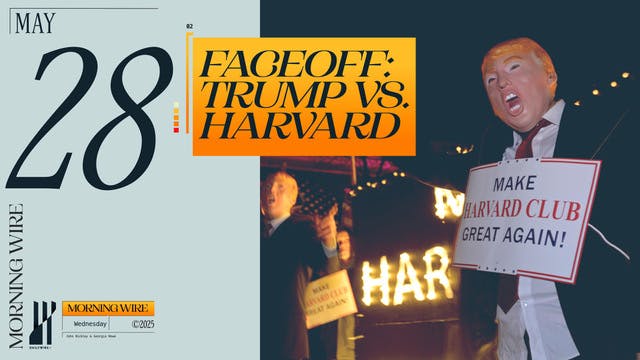Tensions between Russia and the United States rise as Trump and Putin escalate their war of words, NPR follows Harvard in suing the Trump administration in order to retain public funding, and MAHA has set its sights on regulating pesticides, but it’s causing a rift among Republicans.
It’s Wednesday, May 28, and this is the news you need to know to start your day.
Morning Wire is available on video! You can watch today’s episode here:
If you’d rather listen to your news, today’s edition of the Morning Wire podcast can be heard below:
NATO Readies For War

Topline: The U.S. reinforces Europe’s northern front as Russia ramps up its assault on Ukraine.
President Trump took public shots this weekend at Vladimir Putin, calling him “crazy” after he launched an unprecedented aerial barrage on Ukraine. The Kremlin responded by issuing a sarcastic statement, saying, “We are really grateful to the Americans and to President Trump personally for their assistance in organizing and launching this negotiation process…This is a very crucial moment, which is associated, of course, with the emotional overload of everyone absolutely and with emotional reactions.”
That clearly angered Trump, who issued a new statement on Tuesday with a clear threat. “What Vladimir Putin doesn’t realize is that if it weren’t for me, lots of really bad things would have already happened to Russia, and I mean REALLY BAD. He’s playing with fire!”
A number of reports from the White House suggest the president could roll out new sanctions on Moscow as early as this week. Trump is reportedly concerned that sanctions could drive Putin even further from a ceasefire and prolong the war, but the reality is that, barring increased military support for Ukraine, he doesn’t have many other options for exerting pressure.
Because existing sanctions have essentially cut off all trade between the U.S. and Russia, new sanctions would have to target countries doing business with Moscow and theoretically isolate them from the global economy. One proposal would impose a 500% import tariff on any nation that continues to purchase Russian oil, natural gas, and petroleum. Leaders in Congress have told the White House they would approve new sanctions with overwhelming bipartisan support.
However, some experts believe the Russian war machine is robust enough to weather further Western sanctions.
“The Russian economy is relatively stable,” Rebekah Koffler, a former defense intelligence analyst and author of Putin’s Playbook, told The Daily Wire. “Russia produces in three months more military hardware than the entire NATO Alliance produces in one year. … Putin transitioned his military and economy on a wartime footing a decade ago in 2015. They’re even more adequate right now after three years than before.”
Get 40% Off New DailyWire+ Annual Memberships
Trump Vs Harvard

Topline: NPR joins Harvard in suing the Trump administration – in an attempt to cling to their taxpayer funding.
On Tuesday, the Trump administration directed federal agencies to terminate $100 million in remaining contracts with Harvard, citing its failure to address antisemitism and promote national interests. This is the latest development in an ongoing feud between the White House and America’s oldest university, which in the span of about a month has included attempts to cut billions of dollars in federal grants to Harvard and restrict its ability to admit foreign students.
Last Friday, a federal judge in Boston issued a temporary restraining order, stopping the Trump administration’s attempt to block the enrollment of Harvard’s international students. The policy would impact more than 7,000 foreign visa holders, about 30% of Harvard’s student body. Harvard argues that the move by the Trump administration is a direct response to the university’s refusal to comply with demands to have race-blind admissions, end DEI programs, and screen international students for alleged ties to terrorism or antisemitism. Harvard’s president, Alan Garber, told NPR that these actions threaten not just the university, but critical research.
“They see this as a message,” Garber said. “If you don’t comply with what we are demanding these will be the consequences.”
Trump says he’s considering directing Harvard’s funding to trade schools to develop the American workforce instead.
“We give them billions of dollars, which is ridiculous,” Trump said on Sunday. “I’m not going to have a problem with foreign students, but it shouldn’t be 31%. It’s too much, because we have Americans that want to go there and other places, and they can’t go there … No foreign government contributes money to Harvard. We do.”
Meanwhile, NPR, along with three Colorado public radio stations, filed a lawsuit on Tuesday challenging President Trump’s May 1 executive order to cut all federal funding to NPR and PBS, which totals more than $500 million annually. The lawsuit argues the order violates the First Amendment’s protections of free speech and the press. NPR’s CEO, Katherine Maher, called it “retaliatory, viewpoint-based discrimination,” accusing the administration of punishing NPR for its reporting.
MAHA Eyes Pesticides

Topline: A push to regulate pesticides is causing a rift within the GOP.
At the federal and state levels, there’s a looming battle within the Republican Party over potential pesticide regulations. Some Republicans and the broader MAHA coalition of activists want to see pesticides that have been banned in other countries, which are similarly prohibited in the United States. Others within the Republican Party say they’re worried about farmers in their districts who rely on pesticides like glyphosate, which has caught the eye of HHS, and there have been reports about concerns from within the White House that abrupt regulatory action could trigger supply chain issues.
Health and Human Services Secretary Robert F. Kennedy Jr. has spoken out against pesticides for years, claiming that they’re poisoning American children. He’s not backing down from that, but his department has so far toed the line between these two camps in the GOP. For example, top Kennedy advisor Calley Means signaled earlier this month that while HHS will state the “truth” about pesticides, the department has no desire for “nanny state” regulatory measures on these chemicals.
“We ingest 25% of the world’s pesticides in the United States,” Means said at an Axios event. “Other countries across the world have chosen to phase [many leading American pesticides] out or ban them, calling them carcinogenic and disruptive to kids. … The policy solutions from this are not obvious. Pesticides are deeply ingrained into the U.S. agricultural system and it would be a disaster to phase them out tomorrow.”
Meanwhile, there’s legislation in more than a dozen states to shield Bayer – a German multinational chemical company that purchased the American agricultural giant Monsanto in 2018 – from forthcoming legal action over its “failure to warn” about potential harms associated with its products. GOP-led states North Dakota and Georgia have both passed laws to shield Bayer. Other states, including Iowa, Idaho, Florida, Missouri, Oklahoma, and Tennessee, have similar pending legislation. There have been nearly 200,000 lawsuits filed against Bayer, connecting it to the development of cancer and other diseases.
“I think it’s atrocious to believe that any company – any company in America or anywhere – should get any form of blanket immunity for the products that they’re putting in the stream of commerce,” Missouri Republican state Senator Nick Schroer told The Daily Wire. Schroer said that state Republicans were divided over support for the bill, partially because of lobbying by Bayer, but also because many farmers are concerned that they may lose access to herbicides and pesticides if Bayer goes under.

.png)
.png)

